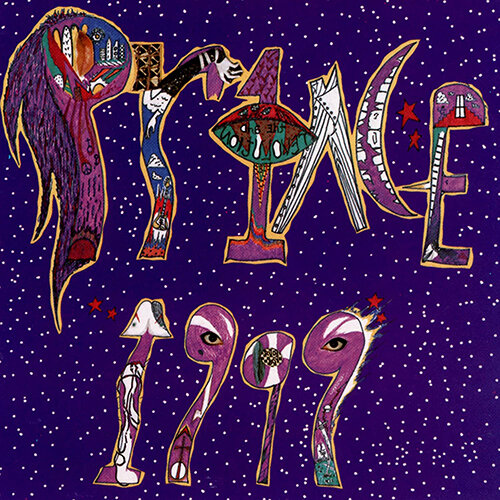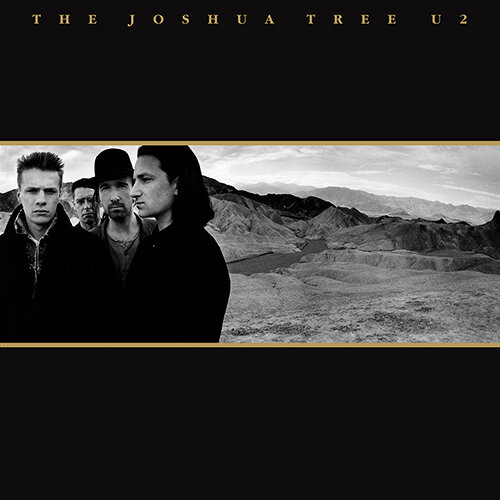#121 Elvis Costello, 'This Year’s Model' (1978)
The second album by Elvis Costello, and the first with his band, The Attractions, is for me, his most accessible record. The album’s upbeat, danceable music is contrasted by its lyrics of heartbreak and relationships. Album opener, ‘No Action,’ tells the story of a past love that is still into the protagonist but the feelings aren’t quite mutual… until she gets into a relationship.
#122 Nine Inch Nails, 'The Downward Spiral' (1994)
The second studio album by Nine Inch Nails was sonically groundbreaking. A concept album about the downward spiral of a man, ‘Mr. Self Destruct’ to his eventual death by suicide. The album built on the sound Trent Reznor had pioneered on debut, ‘Pretty Hate Machine’ (#453), taking industrial music into the mainstream.
#123 Led Zeppelin, 'Led Zeppelin II' (1969)
When I was 15 years old I had a guitar teacher who was never ready for our lesson on a Saturday morning. Often when I’d show up he was still sleeping. He’d sit me in his teaching room as he showered and every week he’d pop the same record on. The album started with a massive riff before segueing into a little drum interlude played exclusively on cymbals after one minute seventeen. One morning, I’m sure after a particularly heavy night, my teacher emerged just as the album started playing for the second time. The little bit with the cymbals started and he started air drumming in the geekiest way you could imagine, telling me that this was the greatest drum solo of all time. “The greatest?” I wondered. “How could it be the greatest? There are no massive drum fills, what is he talking about?” I can still see his scrunched-up face as his hands flailed about. The song, ‘A Whole Lot Of Love,’ the drummer, John Bonham, and the album, this one!
#124 U2, 'Achtung Baby' (1991)
The first U2 record of the ‘90s saw the band take a major shift in their sound. The new decade saw the band make a shift in their sound, incorporating elements of Alternative Rock, Industrial Rock and Electronic Music. Daniel Lanois and Brian Eno, who had held the reigns on ‘The Joshua Tree,’ were back to produce this record. On the intervening record, ‘Rattle and Hum,’ the band had further paid tribute to American music, exploring its roots. Critics labelled the attempt as pretentious and the band were increasingly accused of being self-righteous and sanctimonious. The band keen to shake up their sound, went to Hansa Studio in Berlin, famous as the studio where Bowie recorded his Berlin Trilogy, on the eve of reunification to seek new inspiration.
#125 Beastie Boys, 'Paul's Boutique' (1989)
Three years since their debut record, ‘Licenced To Ill’ (#192), the band had fallen out with that album’s producer, Rick Rubin, as well as his label, Def Jam. Critics had assumed the band was a one-hit-wonder and labelled their debut as frat Hip Hop. On this, the follow up record, the band, newly signed to Capitol Records, had drastically decided to change their sound. This album forged a new frontier in samplology. Produced by the Dust Brothers, the album features a total of 105 different songs sampled.
#126 Mary J. Blige, 'My Life' (1994)
The Queen Of Hip Hop Soul returns with her second and breakthrough album, ‘My Life.’ A raw and truthful record, the album deals with subjects such as depression, her battle with addiction to both drugs and alcohol, as well as the abusive relationship she had been in at the time with K-Ci, from K-Ci & JoJo.
#127 Ray Charles, 'Modern Sounds in Country and Western Music' (1962)
After practically inventing Soul music, Ray Charles, a Southerner from Georgia, sought to explore another Southern genre, which was traditionally white; Country and Western. Following his success in the ‘50s with Soul (see #210), Charles managed to negotiate creative control on his records. When he announced his intention to record a Country record, he was derided by his peers and label execs, however on its release, the album became one of the best-selling albums by a black artist to date.
#128 Queen, 'A Night at the Opera' (1975)
This is the album that broke Queen wide open. Despite enjoying a reasonable level of success on their previous records (‘Sheer Heart Attack’ reached #2 in the UK, while ‘Queen II’ charted at #5), the band was broke due to a bum deal they’d made with Trident Studios and its owner, who also happened to be their manager, Norman Sheffield. Freddie Mercury would dedicate the opening track on the album, ‘Death On Two Legs (Dedicated To…)’ to Sheffield; “Killjoy, bad guy, big-talking, small fry.”
#129 Pink Floyd, 'The Wall' (1979)
While The Who popularized the concept of the Rock Opera, Pink Floyd perfected it with ‘The Wall.’ The album was conceptualized by Roger Waters, who based its main character, Pink (a play on the media and fans thinking that Pink Floyd was the name a solo artist in their early days), on himself and former bandmate, Syd Barrett. The double record explores themes of mental health, bullying, drug use and even war.
#130 Prince, '1999' (1982)
One of the most prolific and influential artists of all-time, Prince has shown up on this countdown repeatedly (his name is mentioned in 15 different album reviews, not including his own album, ‘Dirty Mind (#326). ‘1999,’ his 5th album in 4 years was his major breakthrough and the pre-cursor to his megastardom. You might say he hit a purple patch (I’ll just leave this here). On this record, Prince introduced his band, The Revolution. That’s not to say that Prince didn’t play most of the instruments himself.
#131 Portishead, 'Dummy' (1994)
One of the most interesting and exciting records of the ‘90s, ‘Dummy’ is the debut album by Bristol Trip Hop act, Portishead. Members, Geoff Barrow and Beth Gibbons, who met on a course in 1991 first started putting their ideas together in Neneh Cherry’s kitchen while Barrow worked on her album, Cameron McVey’s record, ‘Homebrew’ (this is the second time Cherry has popped up on this list without actually having a record include; third if you count the fact that her father, Don Cherry was on Ornette Coleman’s ‘The Shape Of Jazz To Come’). While Portishead didn’t invent Trip Hop, they certainly pioneered and popularized it.
#132 Hank Williams, '40 Greatest Hits' (1978)
This record is a career spanning collection of Country legend, Hank Williams’s singles. Williams tragically died at the age of 29 years old in the back of a Cadillac from heart failure brought on by alcohol and drug abuse. Due to an ice storm, Williams had to be driven from gig to gig and it was on the way to a show in Canton, Ohio on New Year’s Day in 1953.
#133 Joni Mitchell, 'Hejira' (1976)
“No regrets Coyote/We just come from such different sets of circumstance,” what a perfect way to start an album. ‘Coyote’ was written about Sam Shepard, a member of Bob Dylan’s entourage from the Rolling Thunder Review with whom Mitchell had a brief relationship. Mitchell joined the tour for a few shows in 1975. She picked up a relationship and a cocaine habit. The song is all about sex, drugs and Folk Rock ‘n Roll. The album in itself is a road trip album. It was written mostly in the car while Mitchell was road tripping solo following ‘The Hissing Of Summer Lawns’ tour (#258).
#134 Fugees, 'The Score' (1996)
Following the disappointing performance of their debut record, the head of the band’s label, Ruffhouse Records decided to give the band another chance. He advanced them $135k, which the band invested into a studio in Wyclef Jean’s uncle’s basement. The result, a #1 record in 10 countries, including the US and 22 million albums sold worldwide.
#135 U2, 'The Joshua Tree' (1987)
During U2’s meteoric rise in the early ‘80s, the band fell in love with the US after multiple months-long tours. Their strong affection for the country inspired them to write ‘The Joshua Tree,’ their love letter to the US. By this stage, they were, by all accounts, an incredibly successful band. They’d enjoyed #1 albums in the UK, Australia & New Zealand and already had a few hit singles under their belt, but it was this record that made them the biggest band in the world. Love them or hate them, U2 created a masterpiece.
#136 Funkadelic, 'Maggot Brain' (1971)
The album opens with a 10-minute trip recorded in one take. Band leader, George Clinton, under the influence of LSD, recorded a monologue over the guitar of Eddie Hazel, who had been told by Clinton to play as if he had been told his mother is dead. In that one song, Hazel gives the performance of a lifetime and it sets the tone for the record. The subsequent tracks are completely different to any of the previous Funkadelic albums we’re heard, or even Parliament, for that matter.
#137 Adele, '21' (2011)
’21,’ the second studio album by Adele was her major breakthrough. Not just a massive album for her, one of the biggest albums in recent years. It’s quite bizarre how people work, to be honest. Along with the massive success of this record came a barrage of criticism and ill-will for Adele, not unsimilar to bands like Coldplay or U2, I guess. Make no mistake, however, this album is phenomenal and all its success is warranted.
#138 Madonna, 'The Immaculate Collection' (1990)
The compilation spans 15 singles between 1983 and 1990. It runs in chronological order and includes most, but not all her singles from that era. Of the 15 tracks, 8 were #1 singles in the US and combined sold in the tens of millions. Hearing these songs all together reminds us of how good Madonna actually is, especially in those early years.
#139 Black Sabbath, 'Paranoid' (1970)
Coming only 7 months after their debut record, ‘Paranoid’ is arguably Black Sabbath’s greatest record and one of the greatest Heavy Metal records of all time. Building on the sound that they had pioneered on their debut record, most of the songs on this record were born out on-stage jams. The album opens with the slow sludgy guitar sounds of ‘War Pigs’ accompanied by a siren; a call to arms in the truest sense, before the tempo picks up. “Generals gathered in their masses/Just like witches at black masses.”
#140 Bob Marley and the Wailers, 'Catch a Fire' (1973)
I, along with the rest of the world, know Bob Marley and The Wailers hits very well, and while this record only includes one “hit,” the rest of the songs on the album hold their own. ‘Catch A Fire’ was the group’s fifth album, but first for Island Records. At the end of 1971, the band embarked on a UK tour with Johnny Nash but following the tour, they got stuck in the UK as they didn’t have the funds to return to Jamaica. Their work permit wouldn’t allow them to earn the money to get back to the UK. Stuck without options, the band reached out to Island Records founder, Chris Blackwell, who advanced the band money to get home and record a new album.



















